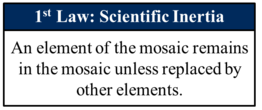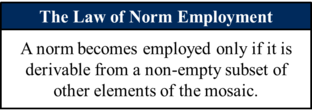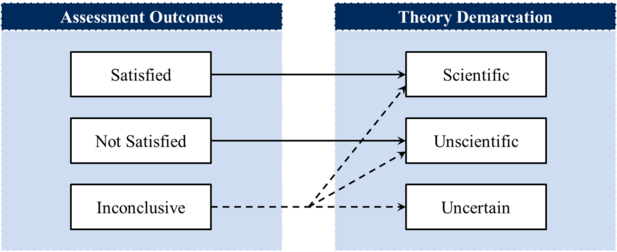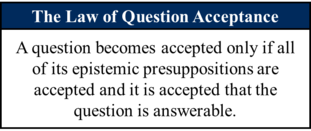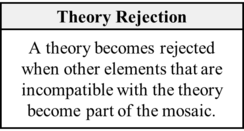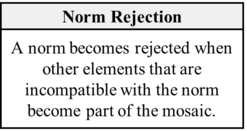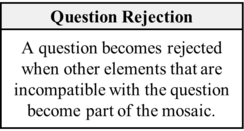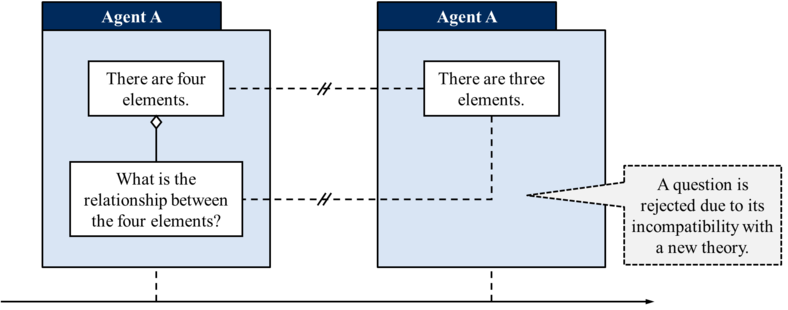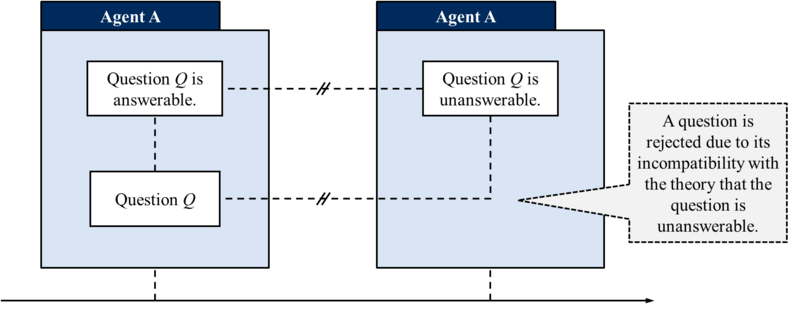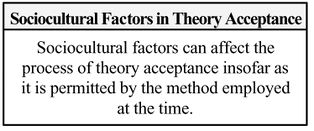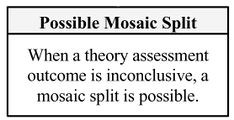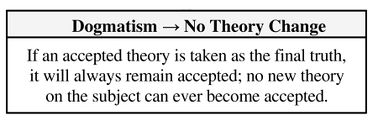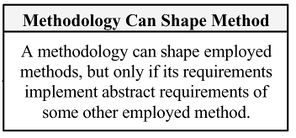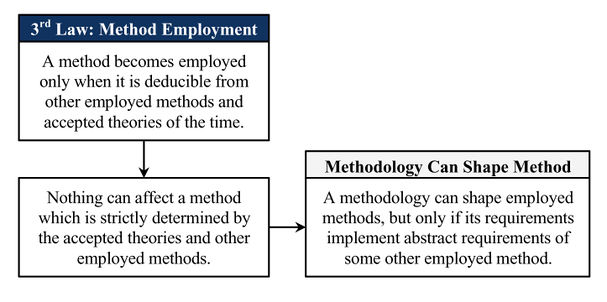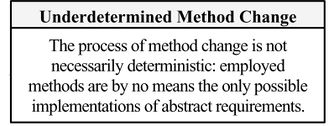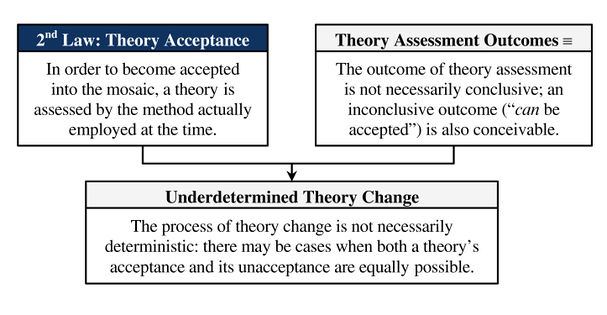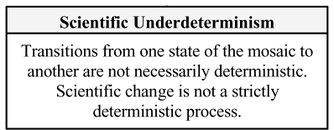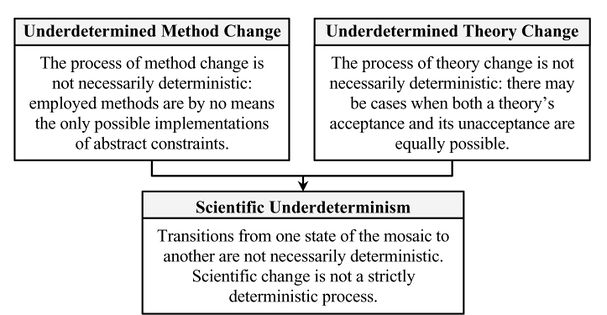Scientonomy
What is scientonomy? What are the core questions of scientonomy?
In the scientonomic context, this question was first formulated by Nicholas Overgaard, Hakob Barseghyan, Gregory Rupik and Paul Patton in 2016. The question is currently accepted as a legitimate topic for discussion by Scientonomy community. The following core questions of Scientonomy are currently accepted in Scientonomy:
Contents
Broader History
To our knowledge, the usage of the term scientonomy as denoting a science of science was first advocated by historian of science Scott Weingart, who is, at the time of this writing, a digital humanities specialist at Carnegie Mellon University. The term has also previously been coined as part of a parody of the Church of Scientology, with a very different intent and definition. We are aware of no other previous uses of the term scientonomy. Although the name had not yet been adopted, the characteristics of this new field are clearly outlined in the first section of The Laws of Scientific Change,1pp. 3-123 which deals with metatheoretical issues. These include the scope, possibility, and assessment of any theory of scientific change.
Scientonomy seeks to join a number of other disciplines that have dealt with the processes of scientific knowledge creation and change from a variety of perspectives.
Philosophy of Science
Philosophy of science deals with a variety of epistemological, metaphysical, and ethical questions arising from scientific inquiry.2 These include both the normative question of how one arrives at reliable scientific knowledge and the descriptive question of how scientists have done so. Philosophical works on the question of how one acquires scientific knowledge date at least to the works of Aristotle (384-322 BCE).
As a distinct modern academic discipline, philosophy of science had its origin with the Vienna Circle in the early twentieth century.32 The Vienna Circle was a group of European philosophers and scientists who met at the University of Vienna during academic terms from 1924 to 1936. It was organized by philosopher and physicist Moritz Schlick, and included the philosopher and logician Rudolf Carnap, the philosopher and sociologist Otto Neurath, and many others.4 Several members were involved in the founding of The Philosophy of Science Association in 1933. The association’s journal, ‘Philosophy of Science’ published its first issue in January 1934.5 The Vienna Circle sought to reconstruct empiricism based on new developments in mathematics, logic, and physics; especially Albert Einstein’s theory of relativity. It became the birthplace of logical empiricism.63 The members of the circle saw themselves as champions of enlightenment, reason, and democracy in a time of metaphysical philosophy, mysticism, romanticism, and nationalism that preceded the rise of Adolf Hitler to power in Germany. They saw scientific rationality as a potent force for progressive social change.73
Logical empiricism was a loosely unified movement rather than a specific body of ideas, but a common thread of thought can nonetheless be identified. The circle sought to reject all metaphysical claims of an underlying 'hidden world' in favor of knowledge grounded in experience, and relationships specified by powerful new tools of formal logic. As Schlick put it, “what every scientist seeks, and seeks alone, are…the rules which govern the connection of experiences, and by which alone they can be predicted”.3p. 30 They made a distinction between two sorts of statements. The first were analytic statements that are necessarily true by convention and empty of factual content. All statements of the formal sciences; mathematics, and logic, are of this sort. The second were synthetic statements whose truth must be verifiable in experience, or from which verifiable statements could be deduced. All other statements, such as those of theology, were pseudo-statements devoid of meaning. They maintained that the diverse scientific disciplines could by unified by a common vocabulary.89 The logical empiricists believed it was possible to distinguish a context of discovery, having the do with the actual historical and psychological processes by which scientific ideas come about, and a context of justification, having to do with the logical structure of scientific claims, and how they can properly be defended and justified. They saw the interests of philosophers of science lying in the latter, ahistorical domain.63
The interests and goals of philosophers of science changed radically in the second half of the twentieth century because of a variety of serious problems with the bold project of logical empiricism. The proliferation of successful scientific theories involving unobservable entities like subatomic particles, molecules, and genes made the logical positivists rejection of the metaphysical notion that a hidden world underlies our experience increasingly untenable. Subsequent to the publication of Thomas Kuhn’s The Structure of Scientific Revolutions in 1962, it became evident that the logic of science could not be understood independently of its history.3
History of Science
The field of history of science attempts to provide a descriptive account of how science has developed over time. Historical works about science have been written since ancient times.10 In modern times, the history of science was established as a distinct academic discipline in the early twentieth century with the founding of the History of Science Society in 1924. The society is the oldest and largest devoted to the discipline.11 It was founded by George Sarton, who also founded the field’s first journal, Isis. Sarton, trained as a chemist and mathematician, authored a three volume four thousand page history of science that covered every civilization from antiquity to the fourteenth century. Sarton defined science as the “totality of positive knowledge”, and maintained that “the history of science is the only history which can illustrate the progress of mankind. In fact, ‘progress’ has no definite and unquestionable meaning in other fields than the field of science”.12 Sarton’s ultimate goal was a philosophy of science that bridged the gap between the sciences and the humanities.
The idea that scientific development involved the continuous accumulation of positive knowledge was challenged by physicist and historian of science Thomas Kuhn in 1962 in his The Structure of Scientific Revolutions.13 Inspired by his studies of the Copernican Revolution, and drawing primarily on examples from the physical sciences, Kuhn argued that scientific development involved revolutionary discontinuities. He spoke of scientific paradigms, which are the reigning scientific conceptual frameworks of non-revolutionary periods. Paradigms are constellations of theoretical beliefs, values, methods, and techniques shared by a scientific discipline. Normal, non-revolutionary science consists in solving problems and explaining new phenomena using the tools provided by the paradigm. A scientific revolution occurs when one paradigm is replaced by another. One groundbreaking aspect of Kuhn's work is that it greatly expanded the scope of what historians generally recognized as science. He argued that the Aristotelian framework that preceded modern science was recognizable as a reasonable scientific framework in terms of its times. Many philosophers of science, steeped in logical empiricism, found Kuhn's notion of the incommensurability of paradigms troubling. It seemed to call into question the rationality of theory choice. On the other hand, Kuhn's work tapped pre-existing philosophical interest in a more historicist and naturalistic view of scientific rationality.14 Post-Kuhnian debates led to the abandonment of the notion of a distinct context of discovery and context of justification. Social scientists saw it as grounds for positing influence by social and political factors external to science on its content. Particularist historical critics questioned the general applicability of Kuhn's ideas. Kuhn's large scale vision had limited influence on historians, who were generally moving towards more small-scale projects.1415
Early work in the history of science usually maintained an internalist focus on science itself, while post-Kuhnian work often seeks to place such work into context within the larger society. Historians of science are interested in the work of particular scientific practitioners, in the instruments and techniques they used to study nature, the ways they represented and communicated their work to others, the institutional arrangements they made to promote their research, and their ideas and arguments, as recorded in surviving manuscripts and papers.16 Historians of science have lacked a generally accepted guiding theoretical interpretive framework.
History and Philosophy of Science
As a joint discipline, history and philosophy of science seeks to create a historicised philosophy of science. The descriptive task of understanding scientific development and the normative task of prescribing reliable methods of seeking knowledge are often not distinguished. Academic programs in the history and philosophy of science were established at both Princeton University and Indiana University in 1960.17 The Indiana department was founded by Norwood Russell Hanson.18 Hanson’s book ‘Patterns of Discovery’, published in 1958 19, stressed the theory-ladenness of observation and the historical nature of scientific rationality in an exploration of modern particle physics.20 As a work in the history of science, Kuhn’s ‘Structure of Scientific Revolutions’ attracted considerable attention from philosophers, in part because some philosophers besides Hanson, including Stephen Toulmin, had been working on rather similar ideas.17 History and philosophy of science programs proliferated in the 1960's and 1970's, fueled in part, by interest in Kuhn's work and in part by the Cold War willingness of western governments to fund projects that promoted interest in science.21 Historicist views of scientific epistemology and rationality have subsequently been dominant. Imre Lakatos presented scientific development in terms of research programs that progressed when they made successful novel predictions, and degenerated when they failed to do so, and when core assumptions were adjusted in an arbitrary manner to avoid falsification.322 Empirical historical evidence led philosophers to reject the notion of a unitary scientific method that had remained fixed through history.23 Laudan’s reticulated model of scientific rationality posited during assessment of a theory, other theories, methods, and values all interact.24 Philosopher Ronald Giere dubbed the joining of history and philosophy of science a "marriage of convenience".25 Many question whether the two have formed a genuinely unified discipline because of the diverse interests and political commitments of those who study the development of science.26
Sociology of Scientific Knowledge
The field of sociology, the scientific study of human social structures, was founded by Robert Merton. In the 1940’s Merton began studying the sociology of scientific communities. However, his studies had little contact with epistemology or philosophy of science, except in the general sense of identifying the social conditions under which scientific inquiry is possible and fruitful. Merton assumed a view of scientific knowledge similar to that of the logical empiricists.3 The philosophers John Stuart Mill, Charles Sanders Peirce, and Karl Popper stressed the social dimension of scientific epistemology, but their view did not become the dominant one until after the publication of Kuhn’s Structure of Scientific Revolutions.7 The ‘strong program’ of the sociology of scientific knowledge (SSK) began in the 1970’s at the University of Edinburgh in Scotland, under the leadership of sociologist Barry Barnes and philosopher David Bloor. Proponents of SSK view knowledge as a collective social product, and seek a naturalistic account of its production. In effect, they seek to use the methods of social science to study science itself.327 A central principle of the ‘strong program’ is the symmetry principle, in which normative epistemological concerns are ‘screened out’ for the sake of illuminating social interactions and relationships involved in the production of knowledge. Its value is most evident when considering knowledge processes far removed from our own by time and culture, such as when understanding how western astronomy disentangled itself from astrology in seventeenth century Europe.26 Social constructivism has sometimes been criticized as an attempt to “explain away” science as nothing but social power structures.7 However, recent attempts to introduce cognitive science concepts into social epistemology hold much promise of naturalizing rationality, and thereby obviating such concerns.2829
Scientonomic History
The term scientonomy was adopted to denote an empirical descriptive science of science subsequent to the publication of The Laws of Scientific Change in 20151 and the establishment of the community in 2016 with its journal and encyclopedia.
Acceptance Record
| Community | Accepted From | Acceptance Indicators | Still Accepted | Accepted Until | Rejection Indicators |
|---|---|---|---|---|---|
| Scientonomy | 1 January 2016 | This is the date of the inception of the discipline. | Yes |
All Core Questions
| Theory | Formulation | Formulated In |
|---|---|---|
| Ontology of Scientific Change Is a Core Question of Scientonomy | Question Ontology of Scientific Change is a core question of Scientonomy. | 2016 |
| Mechanism of Scientific Change Is a Core Question of Scientonomy | Question Mechanism of Scientific Change is a core question of Scientonomy. | 2016 |
Accepted Core Questions
| Community | Theory | Formulation | Accepted From | Accepted Until |
|---|---|---|---|---|
| Scientonomy | Ontology of Scientific Change Is a Core Question of Scientonomy | Question Ontology of Scientific Change is a core question of Scientonomy. | 1 January 2016 | |
| Scientonomy | Mechanism of Scientific Change Is a Core Question of Scientonomy | Question Mechanism of Scientific Change is a core question of Scientonomy. | 1 January 2016 |
Suggested Modifications
Current View
Scientonomy is an emerging academic discipline that studies the process of scientific change. While still very much in the process of inception, it is conceived to have two major branches - theoretical and observational. Theoretical scientonomy attempts to shed light on the ontology and dynamics of the process of scientific change. Observational scientonomy attempts to trace and explain historical and contemporary episodes of scientific change.
The Scope of Scientonomy
The field of scientonomy
The term scientonomy refers to the newly emerging science of science. If science is considered the systematic study of the world, then the science of science is the systematic study of the epistemic processes involving knowledge production. Scientonomy approaches this study in a distinctive way. It is generally accepted nowadays that the body of theories accepted by epistemic agents - individual scientists or epistemic communities - and the methods employed by these agents to evaluate them change over time.1pp. 217-225 As the empirical scientific study of this process of scientific change, scientonomy aims at providing a new approach to developing a naturalistic account of how individuals and communities acquire knowledge and change their epistemic stances towards various epistemic elements. It differs from related fields of inquiry, such as history of science, philosophy of science, or the sociology of scientific knowledge, in that it maintains that the process of scientific change, despite its varied guises, exhibits certain general patterns. It attempts to study and document those patterns by giving them precise formulations. As in any other field of empirical science, the findings of scientonomy are inevitably fallible and are open to modification in the light of new evidence. A new academic workflow has been designed and implemented to trace and document these modification in a piecemeal and transparent fashion.
The basis for this newly emerging field is Barseghyan's theory of scientific change as propounded in his 2015 book, The Laws of Scientific Change.1 It builds on the ideas of Kuhn, Lakatos, Laudan, Shapere, and others, all of which can be considered precursors of scientonomy. The field of scientonomy, given its distinctive concern for both general theory and the explanation of historical particulars is envisioned as having two branches. First, a theoretical branch attempts to uncover the ontology and the general mechanism of scientific change. Secondly, an observational branch attempts to trace and explain individual changes in the mosaics of various epistemic agents.1pp. 72-80
Theoretical Scientonomy
Though highly relevant to the traditional field of philosophy of science, theoretical scientonomy differs from it in that, as a descriptive scientific field, it does not include the normative question of how science should be conducted so as to produce reliable knowledge. In the past, when a unitary and fixed scientific method was believed to exist, the descriptive question of how the process of scientific change actually works was often conflated with the normative question of how it should work if reliable knowledge is to be produced. Scientonomy seeks a clear distinction between the two, and claims only the former as its subject matter.1pp. 12-20 This restriction is motivated by the same concerns as Bloor's symmetry postulate in the sociology of scientific knowledge.26 Scientonomy's descriptive account, however, does include the descriptive study of normative propositions espoused by scientific practitioners such as those contained in their openly accepted norms such as scientific methods or ethical imperatives.30 Theoretical scientonomy concerns itself specifically with two major tasks:
- the formulation of a standard ontology of epistemic entities and relations involved in the process of scientific change; and
- the unearthing of the general patterns that underlie the process of scientific change.
The search for fixed general laws obviates the charge of incoherent relativism sometimes leveled at the sociology of scientific knowledge.31 By seeking such laws, scientonomy hopes to illuminate questions such as the nature of scientific rationality, and the naturalistic epistemological question of how knowledge has been acquired.
Observational Scientonomy
Observational scientonomy is seen as differing from the current discipline of the history of science in significant ways. History of science currently lacks a guiding theory; specifically, the lack of a standardized ontology of epistemic elements and stances often results in incommensurable historical narratives with claims that lack in precision; for instance, when a historian tells us that such-and-such an idea was "endorsed" by a certain agent, it is unclear whether they are talking about that idea being accepted, used, pursued, or some combination of these. It also often focuses on the level of individual scientists, their work, and their social contexts, rather than on epistemic communities. By contrast, observational scientonomy aims at theory-driven investigations of changes in epistemic stances of both individual and communal epistemic agents. It seeks to confront its current theory of scientific change with evidence that may force its alteration, refinement, or replacement, and to apply it to an expanding range of particular episodes, thereby enhancing our general understanding of the processes of scientific change.
Scientonomy vs. Particularism
Scientonomy and the lack of a universal scientific method
The approach of scientonomy contrasts with that of the particularism favored by some historians, social scientists, and philosophers. Particularism holds that the process of scientific change does not possess the sort of regularities that would render it amenable to any general theory. Its proponents typically make the tacit assumption that in order for a general mechanism of scientific change to exist, there must be a universal and unchanging method of science.1pp. xi-xvi, 81-97 Historical evidence now clearly indicates that the methods used by scientists to assess new theories have altered radically over time and between communities. For example, the Aristotelian-medieval method held that a scientific theory should be a set of axioms from which other propositions may be deduced. The axioms should be intuitive in the sense that any person with sufficient experience with the subject should be able to appreciate them.1pp. 143-144 Modern physicists would instead maintain that a theory must make novel predictions that are confirmed by observation and experiment.1p. 145 Scientonomy accepts the evidence that scientific methods have changed over time and differ between communities, but rejects the implication that this renders a theory of scientific change impossible. Instead, it supposes that changes in both theory and method obey a certain set of laws. It is these laws and not the methods of science, that scientonomy takes to be fixed.1pp. 82-8324pp. 33-41
Individual and Communal
Individual scientists differ one from another in their goals, desires, and criteria for theory appraisal. This too might seem to be grounds for rejecting the possibility of a general theory of scientific change. But the decisions to accept new theories, or to employ new methods, are made collectively by scientific communities rather than by individuals acting alone.32 Such communities have emergent properties and behaviors that cannot be understood solely in terms of the properties which their members possess separately. Scientonomy supposes that the general regularities it seeks are to be found at the level of whole scientific communities, rather than with the unruly particulars of the work of individual scientists. It thus focuses its investigations at that level.1pp. 43-52
The Apparent Lack of General Features in Science
The particularist claim that science appears, to superficial observation at least, to possess no general features that have remained fixed through history is not grounds for dismissing the possibility of a theory of scientific change. Theories often reveal that unexpected regularities underlie seemingly disparate phenomena. On the face of it, a point of light revolving in the heavens and a falling apple seem to have nothing whatsoever in common. Newton’s theory of Universal Gravitation asserted, however, that both are movements under the influence of a gravitational force. The theory was highly successful in accounting for both falling bodies and the movements of the planets using a small set of simple general principles. The similarities between the two classes of phenomena only became evident through the formulation of the theory. Success in theory formulation often depends on the ability to identify such unexpected connections.1p. 86
Current Core Questions
In Scientonomy, it is currently accepted that Ontology of Scientific Change and Mechanism of Scientific Change are the core questions of Scientonomy.
Ontology of Scientific Change
In Scientonomy, the accepted answers to the question can be summarized as follows:
- The subtypes of epistemic agent are epistemic community and individual epistemic agent.
- The subtypes of epistemic element are question and theory.
- The subtypes of epistemic stance are compatibility, norm employment, question acceptance, theory acceptance, theory pursuit and theory use.
- The possible outcomes of theory assessment are satisfied, not satisfied, and inconclusive.
Details
Epistemic Community Is a Subtype of Epistemic Agent (Barseghyan-2018) states: "Epistemic Community is a subtype of Epistemic Agent, i.e. epistemic agent is a supertype of epistemic community."
According to Barseghyan, epistemic community is an epistemic agent, i.e. it is capable of taking epistemic stances towards epistemic elements.33Individual Epistemic Agent Is a Subtype of Epistemic Agent (Patton-2019) states: "Individual Epistemic Agent is a subtype of Epistemic Agent, i.e. epistemic agent is a supertype of individual epistemic agent."
According to Patton, individuals are "capable of taking epistemic stances towards epistemic elements, with reason, based on a semantic understanding of the elements and their available alternatives, and with the goal of producing knowledge".34p. 82Question Is a Subtype of Epistemic Element (Rawleigh-2018) states: "Question is a subtype of Epistemic Element, i.e. epistemic element is a supertype of question."
A study of the process of scientific change reveals many cases when a question that was considered legitimate in a certain time-period became illegitimate in another period. For example, the questions such as “what is the weight of phlogiston?” or “why does some matter gain mass as it loses phlogiston?” were accepted as legitimate topics of inquiry for the most part of the 18th century. Yet, once the phlogiston theory was rejected, these questions became illegitimate. Another examples is the question “what is the distance from the earth to the sphere of stars?” that was once considered legitimate by astronomers, but is no longer accepted.35p. 4Similarly, there are questions which are considered legitimate these days but weren't accepted even a few centuries ago. An example of this is the question “what’s the underlying mechanics of the evolution of species?” - a perfectly legitimate topic of biological research nowadays that would have been deemed illegitimate three hundred years ago.35p. 4
These examples suggest that questions are part of the process of scientific changes. More specifically, they are a subtype of epistemic element.Theory Is a Subtype of Epistemic Element (Barseghyan-2015) states: "Theory is a subtype of Epistemic Element, i.e. epistemic element is a supertype of theory."
According to this theory, theories are a subtype of epistemic element. Among other things, this assumes that epsitemic stances can be taken by epistemic agents towards theories.Theory Acceptance Is a Subtype of Epistemic Stance (Barseghyan-2015) states: "Theory Acceptance is a subtype of Epistemic Stance, i.e. epistemic stance is a supertype of theory acceptance."
Norm Employment Is a Subtype of Epistemic Stance (Barseghyan-2018) states: "Norm Employment is a subtype of Epistemic Stance, i.e. epistemic stance is a supertype of norm employment."
Question Acceptance Is a Subtype of Epistemic Stance (Rawleigh-2018) states: "Question Acceptance is a subtype of Epistemic Stance, i.e. epistemic stance is a supertype of question acceptance."
Compatibility Is a Subtype of Epistemic Stance (Fraser-Sarwar-2018) states: "Compatibility is a subtype of Epistemic Stance, i.e. epistemic stance is a supertype of compatibility."
According to Fraser and Sarwar, "compatibility is a distinct epistemic stance that agents can take towards elements".36p.70 They show this by arguing that it is possible to take the stance of compatibility towards a pair of elements without taking any of the other stances towards these elements. Thus, compatibility is distinct from acceptance, since two elements need not be in the same mosaic, or even accepted by any agent to be considered, in principle, compatible. For example, an epistemic agent may consider Ptolemaic astrology compatible with Aristotelian natural philosophy without accepting either Ptolemaic astrology or Aristotelian natural philosophy. Compatibility is also different from use, since a pair of theories can be considered compatible regardless of whether any of them is considered useful. For instance, one can consider quantum mechanics and evolutionary biology compatible, while finding only the former useful. Finally, compatibility is also distinct from pursuit, since an agent can consider a pair of theories compatible with or without pursuing either. An agent, for instance, may find two alternative quantum theories pursuitworthy while clearly realizing that the two are incompatible.Theory Use Is a Subtype of Epistemic Stance (Barseghyan-2015) states: "Theory Use is a subtype of Epistemic Stance, i.e. epistemic stance is a supertype of theory use."
Theory Pursuit Is a Subtype of Epistemic Stance (Barseghyan-2015) states: "Theory Pursuit is a subtype of Epistemic Stance, i.e. epistemic stance is a supertype of theory pursuit."
Theory Assessment Outcomes (Patton-Overgaard-Barseghyan-2017) states: "The possible outcomes of theory assessment are satisfied, not satisfied, and inconclusive."
According to this ontology of theory assessment outcomes, when a theory is assessed by a method, one of the three following outcomes can obtain:1p. 199- Satisfied: the theory is deemed to conclusively meet the requirements of the method employed at the time.
- Not Satisfied: the theory is deemed to conclusively not meet the requirements of the method employed at the time.
- Inconclusive: it is unclear whether or not the requirements of the method employed at the time are met.
While the first two assessment outcomes are conclusive, the third outcome is inconclusive, as it permits more than one possible course of action. Thus, in this view, a theory's assessment outcome is not necessarily conclusive; an inconclusive outcome is also conceivable.
This ontology is assumed by the second law of scientific change as formulated by Patton, Overgaard, and Barseghyan in 2017.
Mechanism of Scientific Change
In Scientonomy, the accepted answers to the question can be summarized as follows:
- An element of the mosaic remains in the mosaic unless replaced by other elements.
- If a theory satisfies the acceptance criteria of the method employed at the time, it becomes accepted into the mosaic; if it does not, it remains unaccepted; if assessment is inconclusive, the theory can be accepted or not accepted.
- A norm becomes employed only if it is derivable from a non-empty subset of other elements of the mosaic.
- If a pair of elements satisfies the compatibility criteria employed at the time, it becomes compatible within the mosaic; if it does not, it is deemed incompatible; and if assessment is inconclusive, the pair can become compatible, incompatible, or its status may be unknown.
- A question becomes accepted only if all of its epistemic presuppositions are accepted and it is accepted that the question is answerable.
- A theory becomes rejected when other elements that are incompatible with the theory become part of the mosaic.
- A norm becomes rejected when other elements that are incompatible with the norm become part of the mosaic.
- A question becomes rejected when other elements that are incompatible with the question become part of the mosaic.
- Sociocultural factors can affect the process of theory acceptance insofar as it is permitted by the method employed at the time.
- When two mutually incompatible theories satisfy the requirements of the current method, the mosaic necessarily splits in two. When a theory assessment outcome is inconclusive, a mosaic split is possible. When a mosaic split is a result of the acceptance of only one theory, it can only be a result of inconclusive theory assessment.
- If an accepted theory is taken as the final truth, it will always remain accepted; no new theory on the subject can ever be accepted.
- A methodology can shape employed methods, but only if its requirements implement abstract requirements of some other employed method.
- Transitions from one state of the mosaic to another are not necessarily deterministic. Scientific change is not a strictly deterministic process. The process of method change is not necessarily deterministic: employed methods are by no means the only possible implementations of abstract requirements. The process of theory change is not necessarily deterministic: there may be cases when both a theory's acceptance and its unacceptance are equally possible.
Details
The First Law (Barseghyan-2015) states: "An element of the mosaic remains in the mosaic unless replaced by other elements."
The following passage from The Laws of Scientific Change summarizes the gist of the law:According to the first law, any element of the mosaic of accepted theories and employed methods remains in the mosaic except insofar as it is overthrown by another element or elements. Basically, the law assumes that there is certain inertia in the scientific mosaic: once in the mosaic, elements remain in the mosaic until they get replaced by other elements. It is reasonable therefore to call it the law of scientific inertia.1p. 123
The Second Law (Patton-Overgaard-Barseghyan-2017) states: "If a theory satisfies the acceptance criteria of the method employed at the time, it becomes accepted into the mosaic; if it does not, it remains unaccepted; if assessment is inconclusive, the theory can be accepted or not accepted."
According to this formulation of the second law, if a theory satisfies the acceptance criteria of the method actually employed at the time, then it becomes accepted into the mosaic; if it does not, it remains unaccepted; if it is inconclusive whether the theory satisfies the method, the theory can be accepted or not accepted.Unlike the previous formulation of the second law, this formulation makes the causal connection between theory assessment outcomes and cases of theory acceptance/unacceptance explicit. In particular, it specifies what happens to a theory in terms of its acceptance/unacceptance when a certain assessment outcome obtains.
In addition, this new formulation is clearly not a tautology because it forbids certain logically possible scenarios, such as a theory satisfying the method of the time yet remaining unaccepted.The Law of Norm Employment (Rawleigh-2022) states: "A norm becomes employed only if it is derivable from a non-empty subset of other elements of the mosaic."
Sebastien's law of method employment faces several problems. Foremost among these is that it is based on an outdated ontology that assumes that methods of theory evaluation are a fundamental epistemic element. After the acceptance of Barseghyan’s proposal that methods be subsumed under the category of normative theories, the third law no longer exhaustively covers all situations cases of employment. In its present form it is limited to methods, though there is no reason to think that the mechanism by which a method is employed is any different than the mechanism by which any other norm is employed.In addition, Sebastien's formulation of the third law uses the term deducible, which currently lacks a scientonomic definition. We do not currently know what it means for something to be deducible, what the criteria of deducibility would be, or whether the conditions of deducibility would be part of the first-order theories of the mosaic or part of the second-order theories that range over the mosaic.
The third issue with Sebastien's formulation is that, with the acceptance of questions into the epistemic elements of the ontology of scientific change, the elements of the mosaic are now more expansive than just theories and subtypes of theories. This means that there is a plausible situation in which norms could potentially be derived – at least in part – from questions, which means that a formulation of the third law that excludes questions would fail to comprehensively describe all cases of norm employment.
The new law of norm employment aims to remedy all three of these issues:
- the formulation of the covers all norms rather than only methods;
- it replaces a deducible with derivable, which in the context of mathematical model theory simply means to be semantically entailed, and thus can potentially include non-deductive inferences (e.g. inductive, abductive);
- it replaces a specific enumeration of epistemic elements with a general "elements of the mosaic".
The Law of Compatibility (Fraser-Sarwar-2018) states: "If a pair of elements satisfies the compatibility criteria employed at the time, it becomes compatible within the mosaic; if it does not, it is deemed incompatible; and if assessment is inconclusive, the pair can become compatible, incompatible, or its status may be unknown."
The law of compatibility links the compatibility criteria with various assessment outcomes. If compatibility is defined as the ability of a pair of elements to co-exist in the same mosaic, then the assessment for compatibility is essentially the process by which the epistemic agent decides whether any given pair of elements (i.e. theories, questions, methods) can be simultaneously part of their mosaic. Such an assessment can yield three possible outcomes - satisfied, not satisfied, and inconclusive.36p. 73 Accordingly, the law of compatibility states that if a pair of elements does satisfy the compatibility criteria of the time, then it is deemed as compatible. If, however, an element is taken to be incompatible with the other one, then the pair is deemed as incompatible. Finally, the assessment of compatibility may be inconclusive. In this case, the pair may be deemed compatible, incompatible, or its status may remain unknown. The diagram below summarizes the relation between assessment outcomes and their effects:The Law of Question Acceptance (Barseghyan-Levesley-2021) states: "A question becomes accepted only if all of its epistemic presuppositions are accepted and it is accepted that the question is answerable."
First, the law implies that the acceptance of a question is predicated upon the acceptance of all of its epistemic presuppositions. Importantly, the law works with the notion of epistemic presupposition, rather than logical presupposition, as it would be unreasonable to expect that all logical presuppositions of a question can ever be accepted. This is due to the inherent "explosiveness" of logical presuppositions: if question Q presupposes theory T1 and T1 logically implies theory T2, then question Q also presupposes theory T2. But since a theory can have an infinite number of logical consequences, a question can also have an infinite number of logical presuppositions. For instance, among logical presuppositions of the question 'What is the distance between the Earth and the sphere of the stars?' are not only theories 'The Earth exists' and 'The sphere of the stars exists', but also 'The Earth exists or God exists', 'The Earth exists or it is made of cheese', 'The sphere of the stars exists or God exists', 'The sphere of the stars exists or it is made of cheese' and so on.37p. 6 In contrast, the epistemic presuppositions of a question are not explosive as they are agent-dependent: "what can be a presupposition for one agent need not necessarily qualify as a presupposition for another agent".37p. 5 As explained by Barseghyan and Levesley:A theory would count as an epistemic presupposition of a certain question for an agent, only if the agent is prepared to accept that theory when they accept an answer to the question, irrespective of what that answer is. Consider, for example an epistemic agent who, when accepting p, nevertheless does not accept p-or-q in order not to clutter their mosaic and avoid explosion. For such an agent, not all logical presuppositions of a question would count as epistemic presuppositions.37p. 5
Thus, for most agents, such theories as 'The Earth exists or God exists' and 'The Earth exists or it is made of cheese' would likely not be within the epistemic presuppositions of the question 'What is the distance between the Earth and the sphere of the stars?' if only because most agents wouldn't want to clutter their mosaics with such theories. Generally speaking, "for agents with finite epistemic capacities, a question always has a finite number of epistemic presuppositions".37p. 6
Second, the law stipulates that the acceptance of a question is also predicated upon the acceptance of a second-order theory that the question itself is, in principle, answerable. Thus, the acceptance of all of the epistemic presuppositions of a question is necessary but not sufficient for the question to become accepted.Theory Rejection theorem (Barseghyan-Pandey-2023) states: "A theory becomes rejected when other elements that are incompatible with the theory become part of the mosaic."
According to Pandey's new formulation of the theory rejection theorem, a theory becomes rejected only when other epistemic elements that are incompatible with the theory become accepted. This formulation differs from Barseghyan's original formulation in that it allows a theory to be replaced by an epistemic element of any type, not just by other theories. In other respects, Pandey's formulation is similar to Barseghyan's.Implicit in both theorems is the idea that each theory is assessed on an "individual basis by its compatibility with the propositions of the newly accepted theory".1p. 168 If it turns out that a previously accepted theory is compatible with the newly accepted theory, it remain in the agent's mosaic.
Although we normally expect a theory to be replaced by another theory in the same "field" of inquiry, Barseghyan and Pandey both agree that this is not necessarily the case. For example, Barseghyan writes, "HSC knows several cases where an accepted theory became rejected simply because it wasn’t compatible with new accepted theories of some other fields".1p. 171 Similarly, Pandey provides several examples of this phenomenon in Dilemma of The First Law.38
Barseghyan summarizes the theory rejection theorem as such:
In short, when the axioms of a theory are replaced by another theory, some of the theorems may nevertheless manage to stay in the mosaic, provided that they are compatible with the newly accepted theory. This is essentially what the theory rejection theorem tells us. Thus, if someday our currently accepted general relativity gets replaced by some new theory, the theories that followed from general relativity, such as the theory of black holes, may nevertheless manage to remain in the mosaic. 1p. 171
Norm Rejection theorem (Pandey-2023) states: "A norm becomes rejected when other elements that are incompatible with the norm become part of the mosaic."
The previous scientonomic account of transitions from the stance of employment to that of unemployment applied exclusively to methods. With Rawleigh's suggestion to expand the third law from applying to methods only to norms of all types, it became important to also have a theorem describing how norms of all types become rejected. Pandey's formulation fills this gap and stipulates that norms become unemployed when they are incompatible with other elements that enter into the mosaic.Question Rejection theorem (Barseghyan-Levesley-Pandey-2023) states: "A question becomes rejected when other elements that are incompatible with the question become part of the mosaic."
Pandey's formulation essentially preserves the gist of Barseghyan and Levesley's formulation but fixes its wording to ensure that the theorem actually follows from its premises. Like other scientonomic rejection theorems, the question rejection theorem assumes that questions become rejected as they get pushed out of an agent's mosaic due to their incompatibility with some newly accepted elements. There are two most common scenarios of such incompatibility.In the first scenario, a question becomes rejected due to the acceptance of a new theory that happens to be incompatible with some of the question's epistemic presuppositions. As explained by Barseghyan and Levesley:
imagine an epistemic situation where agent A initially accepts the question “What is the relationship between the four elements?” together with the theoretical presupposition that there are four elements. Suppose also that at some later time the agent discovers that there are not four but three elements. Naturally, the agent rejects both the theory of four elements and the question about the relationships between these elements:
Importantly, this rejection happens regardless of whether it ever occurs to the agent to ask a new question “What is the relationship between the three elements?”. Even if the agent never accepts any further questions concerning the three elements, the question “What is the relationship between the four elements?” would still be rejected.37pp. 14-15
In the second scenario, a question is being rejected due to the acceptance of the second-order theory stating that the question is unanswerable (the latter being incompatible with the question). In the words of Barseghyan and Levesley:
Consider [an] epistemic situation, where agent A accepts some question Q, together with the theory that Q is answerable. When agent A comes to accept that Q is unanswerable, the agent rejects question Q. The scientonomic mechanism of this rejection is through the incompatibility of question Q and the theory “Question Q is unanswerable”:37p. 15
Sociocultural Factors in Theory Acceptance theorem (Barseghyan-2015) states: "Sociocultural factors can affect the process of theory acceptance insofar as it is permitted by the method employed at the time."
Sociocultural factors can impact the process of a theory's acceptance when the employed method of the community allows for such factors to affect the process. This is derived by the Second Law alone. For example, a community which ascribes infallible power to a leader or a group of leaders is in a position to accept a theory in virtue of the leaders. Furthermore, such factors can guide a scientific community to reject a theory based on the acceptance of another social theory with which it is at odds.Barseghyan’s Laws of Scientific Change break from the traditional language used in philosophy of science, of internal versus external factors in the mosaic. External factors, a term that has traditionally referred to the influences of societal trends, politics, religion, and so on, if defined as “elements not included in the mosaic” then we must accept that these do not affect the mosaic at the time by the the very definition. This is the result of the fact that the 2nd law introduces new theories in the context of the accepted methods at the time. As a result, the language of “external” factors is problematic.1
Socio-cultural factors ought to be defined more explicitly. The question is, instead, whether factors such as economics, politics, and religion can influence the theories accepted in the mosaic. It follows from the Second Law that theories are assessed by the method in the mosaic at the time. Therefore, if the method at the time mandates economic, political, religious, or other social requirements to be met by a theory before it is accept, only then do socio-cultural factors influence theory acceptance.
Barseghyan provides the example of a hypothetical religious community, with an accepted belief (i.e. theory) that holds that the religion’s High Priest always grasps the true essence of things. By the Third Law, a method may be employed the mosaic that states that any proposition is acceptable, given that the High Priest utters it. In this case, it would appear as though socio-cultural factors are influencing, if not dictating, the course of scientific change in the community. This should not be confused with a case where a High Priest or other elite enforces their beliefs unscientifically, through threats, bribery, or otherwise. Should this happen, the change would be unscientific, as it would violate either the method employed at the time (and thereby the Second Law), or it would be creating a method in the mosaic which does not follow from the accepted theories at the time (and thereby the Third Law).1Necessary Mosaic Split theorem (Barseghyan-2015) states: "When two mutually incompatible theories satisfy the requirements of the current method, the mosaic necessarily splits in two."
Necessary mosaic split is a form of mosaic split that must happen if it is ever the case that two incompatible theories both become accepted under the employed method of the time. Since the theories are incompatible, under the zeroth law, they cannot be accepted into the same mosaic, and a mosaic split must then occur, as a matter of logical necessity.1pp. 204-207 The necessary mosaic split theorem is thus required to escape the contradiction entailed by the acceptance of two or more incompatible theories. In a situation where this sort of contradiction obtains the mosaic is split and distinct communities are formed each of which bears its own mosaic, and each mosaic will include exactly one of the theories being assessed. By the third law, each mosaic will also have a distinct method that precludes the acceptance of the other contender theory.Possible Mosaic Split theorem (Barseghyan-2015) states: "When a theory assessment outcome is inconclusive, a mosaic split is possible."
Possible mosaic split is a form of mosaic split that can happen if it is ever the case that theory assessment reaches an inconclusive result. In this case, a mosaic split can, but need not necessarily, result.1pp. 208-213 That is, "the sufficient condition for this second variety of mosaic split is an element of inconclusiveness in the assessment outcome of at least one of the contender theories".1p. 208Barseghyan notes that, "if there have been any actual cases of inconclusive theory assessment, they can be detected only indirectly".1p. 208 Therefore:
Thus, the historical examples of mosaic split below also serve as points of detection for historical instances of inconclusive theory assessment.One way of detecting an inconclusive theory assessment is through studying a particular instance of mosaic split. Unlike inconclusiveness, mosaic split is something that is readily detectable. As long as the historical record of a time period is available, it is normally possible to tell whether there was one united mosaic or whether there were several different mosaics. For instance, we are quite confident that in the 17th and 18th centuries there were many differences between the British and French mosaics.1p. 208
Split Due to Inconclusiveness theorem (Barseghyan-2015) states: "When a mosaic split is a result of the acceptance of only one theory, it can only be a result of inconclusive theory assessment."
Split due to inconclusiveness can occur when two mutually incompatible theories are accepted simultaneously by the same community.Dogmatism No Theory Change theorem (Barseghyan-2015) states: "If an accepted theory is taken as the final truth, it will always remain accepted; no new theory on the subject can ever be accepted."
No theory acceptance may take place in a genuinely dogmatic community. "Namely," as is noted in Barseghyan (2015), Barseghyan notes, when introducing the theory rejection theorem in Barseghyan (2015), "theory change is impossible in cases where a currently accepted theory is considered as revealing the final and absolute truth".1p. 165Methodology Can Shape Method theorem (Barseghyan-2015) states: "A methodology can shape employed methods, but only if its requirements implement abstract requirements of some other employed method."
A methodology can affect an employed method when it implements one or more abstract requirements of another employed method. Thus, the role normative methodology plays in the process of scientific change is a creative role, in which methods are changed through the implementation of other abstract requirements from some other employed method.This theorem follows from former description of the third law, which states that a method becomes employed only when it is deducible from other employed methods and accepted theories of the time.
This description of the third law leaves room for methodologies’ to play an active role in scientific change in cases when a concrete method fulfills the requirements of an employed abstract method. The same abstract requirements can usually be implemented in a wide range of different ways. For instance, if there is a whole array of concrete cell counting methods all implementing the same abstract requirement that when counting the number of cells, the resulting value is acceptable only if it is obtained with an "aided" eye.1pp. 151-152 In such cases, methodology can play a decisive role in method employment; what later becomes the requirements of the employed method can be first suggested as a methodology. Thus, the double-blind trial method was first devised as a methodology, as a set of explicitly stated rules, and only after that did it become actually employed as a method of drug testing.1pp. 240-243
Sebastien (2016)'s new definition of methodology offers an alternate means for methodologies to shape methods, although this is not stated in the existing formulation of the theory. Because methodology is understood as a subkind of Normative Theory, it should be possible for the Third Law to deduce an abstract method from a set of theories including some of the normative methodologies a community holds about their method. In this way, it would be necessary for this method to take into account how the community believes its method works, in any concrete implementation of said method, just as a community takes into account descriptive theories (e.g. the placebo effect and experimenter's bias) when employing a new method.Underdetermined Method Change theorem (Barseghyan-2015) states: "The process of method change is not necessarily deterministic: employed methods are by no means the only possible implementations of abstract requirements."
The third law allows for two distinct scenarios of method employment. A method may become employed because it follows strictly from accepted theories or employed methods, or it may the abstract requirements of some other employed method. This second scenario allows for creative ingenuity and depends on the technology of the times, therefore it may be fulfilled in many ways and allows underdeterminism 1p. 198.Underdetermined Theory Change theorem (Barseghyan-2015) states: "The process of theory change is not necessarily deterministic: there may be cases when both a theory's acceptance and its unacceptance are equally possible."
The process of theory assessment under the TSC is underdetermined for two reasons. First, only theories that are constructed are available for assessment. Whether or not a theory is ever constructed is, at least partly a matter of creativity, and is therefore outside the scope of the TSC. Second, it is at least theoretically possible that a process of theory assessment will be inconclusive. This might be because the requirements of the method employed at the time might be vague (e.g. Aristotelian requirements of "intuition schooled by experience").1p. 199-200Scientific Underdeterminism theorem (Barseghyan-2015) states: "Transitions from one state of the mosaic to another are not necessarily deterministic. Scientific change is not a strictly deterministic process."
Scientific underdetermination is the thesis that the process of scientific change is not deterministic, and science could have evolved differently than it did. Hypothetically, two scientific communities developing separately could experience an entirely different sequence of successive states of their respective scientific mosaics. Even without the TSC, the implausibility of scientific determinism can be seen by considering the process of theory construction, which is outside the present scope of the TSC. Theory construction requires creative imagination, and the formulation of a given theory is therefore not inevitable. Still, underdetermination can also be inferred as a theorem from the axioms of the TSC.1pp. 196-198This deductive inference occurs as follows. The theorem is the consequence of two related theses: that of underdetermined method change, and that of underdetermined theory change. Since method change and theory change are exactly the transitions in the scientific mosaic, showing that neither method change nor theory change is deterministic is sufficient to imply the Scientific Underdetermination theorem (SUT).
The underdetermination of method change follows from the 3rd Law: “A method becomes employed only when it is deducible from some subset of other employed methods and accepted theories of the time.” As a result of this law, a method can be employed in two ways: either it strictly follows from other accepted theories and employed methods, in which case the change is, in fact, deterministic, or it implements the abstract requirements of some other employed method. In the latter case, the change is underdetermined since abstract requirements can give rise to many different implementations. As a concrete example, we have an accepted theory that states, “when counting the number of living cells, the resulting value is acceptable only if it is obtained with an ‘aided’ eye.” A number of different methods can implement this abstract requirement, like the plating method or the counting chamber method.1p. 198 Thus the method is underdetermined by the abstract requirements, so the process of method change implementing these requirements is not deterministic, which is exactly the statement of the underdetermination of method change.
The underdetermination of theory change comes from the 2nd law and the possibility of inconclusive theory assessment. The 2nd law states that “In order to become accepted into the mosaic, a theory is assessed by the method actually employed at the time”. This assessment can result in conclusive acceptance, conclusive rejection, or it can be inconclusive. In both conclusive cases, the theory change is deterministic, but if the theory assessment is inconclusive, then the theory can be accepted or rejected. So the process of theory change is not necessarily deterministic, since it is, in fact, possible for assessment to be inconclusive. The question of whether there actually exist cases of inconclusive theory assessment is a task for the history of science, and is irrelevant to our discussion.
These two theses combine to form the SUT, since changes in theories and methods are all the transitions that occur in the scientific mosaic, and we have seen that the underdetermination of theory and method change follow deductively from the 2nd law, the 3rd law and the possibility of inconclusive theory assessment.
Discipline Hierarchy
Subdisciplines
In Scientonomy, the accepted subdisciplines of Scientonomy are:
Superdisciplines
In Scientonomy, there are currently no accepted superdisciplines of Scientonomy.
References
- a b c d e f g h i j k l m n o p q r s t u v w x y z aa ab ac ad ae Barseghyan, Hakob. (2015) The Laws of Scientific Change. Springer.
- a b Kitcher, Phillip. (2016) Philosophy of Science. In Encyclopedia Britannica (2016). Retrieved from https://www.britannica.com/topic/philosophy-of-science.
- a b c d e f g h i Godfrey-Smith, Peter. (2003) Theory and Reality. University of Chicago Press.
- ^ Uebel, Thomas. (2016) Vienna Circle. In Zalta (Ed.) (2016). Retrieved from http://plato.stanford.edu/archives/spr2016/entries/vienna-circle/.
- ^ Douglas, Heather. (2016) A History of the Philosophy of Science Association before 1970. Philosophy of Science Association website. Retrieved from http://philsci.org/about-the-psa/history-of-the-association.
- a b Creath, Richard. (2011) Logical Empricism. In Zalta (Ed.) (2016). Retrieved from http://plato.stanford.edu/entries/logical-empiricism/.
- a b c Longino, Helen. (2015) The Social Dimensions of Scientific Knowledge. In Zalta (Ed.) (2016). Retrieved from http://plato.stanford.edu/archives/spr2016/entries/scientific-knowledge-social/.
- ^ Cat, Jordi. (2014) Unity of Science. In Zalta (Ed.) (2016). Retrieved from http://plato.stanford.edu/entries/scientific-unity/.
- ^ Hanfling, Oswald. (2004) Logical Positivism. In Shanker (Ed.) (2004), 193-213.
- ^ Zhmud, Leonid. (2006) The Origin of the History of Science in Classical Antiquity. Walter de Gruyter GmbH and Co..
- ^ History of Science Society. (2016) History of the Society. History of Science Society website. Retrieved from http://hssonline.org/about/history-of-the-society/.
- ^ Garfield, Eugene. (1985) The Life and Career of George Sarton: The Father of History of Science. Journal of the History of the Behavioral Sciences 40, 107-117.
- ^ Kuhn, Thomas. (1962) The Structure of Scientific Revolutions. University of Chicago Press.
- a b Golinski, Jan. (2012) Thomas Kuhn and the Interdisciplinary Conversation: Why Historians and Philosophers of Science Quit Talking to One Another. In Mauskopf and Schmaltz (Eds.) (2012), 13-28.
- ^ Bird, Alexander. (2011) Thomas Kuhn. In Zalta (Ed.) (2016). Retrieved from http://plato.stanford.edu/archives/sum2016/entries/thomas-kuhn/.
- ^ Gooding, David. (1985) What is the History of Science? History Today website. Retrieved from http://www.historytoday.com/richard-tomlinson/what-history-science-part-i.
- a b Mauskopf, Seymour and Schmaltz, Tad. (2012) Introduction. In Mauskopf and Schmaltz (Eds.) (2012), 1-12.
- ^ Hickney, Thomas. (2016) Twentieth Century Philosophy of Science: A History. T. J. Hickney. Retrieved from http://www.philsci.com/.
- ^ Hanson, Norwood. (1958) Patterns of Discovery. Cambridge University Press.
- ^ Lund, Matthew. (2010) N. R. Hanson: Observation, Discovery, and Scientific Change. Humanity books.
- ^ Miller, David. (2012) The History and Philosophy of Science History. In Mauskopf and Schmaltz (Eds.) (2012), 29-48.
- ^ Lakatos, Imre. (1978) Philosophical Papers: Volume 1. The Methodology of Scientific Research Programmes. Cambridge University Press.
- ^ Grobler, Adam. (1990) Between Rationalism and Relativism: On Larry Laudan's Model of Scientific Rationality. The British Journal for the Philosophy of Science 41 (4), 493-507.
- a b Laudan, Larry. (1984) Science and Values. University of California Press.
- ^ Giere, Ronald. (2012) History and Philosophy of Science: Thirty Five Years Later. In Mauskopf and Schmaltz (Eds.) (2012), 59-66.
- a b c Golinski, Jan. (1998) Making Natural Knowledge: Constructivism and the History of Science. Cambridge University Press.
- ^ Barnes, Barry; Bloor, David and Henry, John. (1996) Scientific Knowledge: A Sociological Analysis. University of Chicago Press.
- ^ Giere, Ronald and Moffatt, Barton. (2003) Distributed Cognition: Where the Cognitive and the Social Merge. Social Studies of Science 22 (2), 301-310.
- ^ Giere, Ronald. (2002) Scientific Cognition as Distributed Cognition. In Carruthers, Stitch, and Siegal (Eds.) (2002), 285-299.
- ^ Sebastien, Zoe. (2016) The Status of Normative Propositions in the Theory of Scientific Change. Scientonomy 1, 1-9. Retrieved from https://www.scientojournal.com/index.php/scientonomy/article/view/26947.
- ^ Siegel, Harvey. (2011) Relativism, Incoherence, and the Strong Program. In Schantz and Seidel (Eds.) (2011).
- ^ Longino, Helen. (2016) The Social Dimensions of Scientific Knowledge. In Zalta (Ed.) (2016). Retrieved from http://plato.stanford.edu/archives/spr2016/entries/scientific-knowledge-social/.
- ^ Barseghyan, Hakob. (2018) Redrafting the Ontology of Scientific Change. Scientonomy 2, 13-38. Retrieved from https://scientojournal.com/index.php/scientonomy/article/view/31032.
- ^ Patton, Paul. (2019) Epistemic Tools and Epistemic Agents in Scientonomy. Scientonomy 3, 63-89. Retrieved from https://scientojournal.com/index.php/scientonomy/article/view/33621.
- a b Rawleigh, William. (2018) The Status of Questions in the Ontology of Scientific Change. Scientonomy 2, 1-12. Retrieved from https://scientojournal.com/index.php/scientonomy/article/view/29651.
- a b Fraser, Patrick and Sarwar, Ameer. (2018) A Compatibility Law and the Classification of Theory Change. Scientonomy 2, 67-82. Retrieved from https://scientojournal.com/index.php/scientonomy/article/view/31278.
- a b c d e f Barseghyan, Hakob and Levesley, Nichole. (2021) Question Dynamics. Scientonomy 4, 1-19. Retrieved from https://scientojournal.com/index.php/scientonomy/article/view/37120.
- ^ Pandey, Aayu. (2023) Dilemma of the First Law. Scientonomy 5, 25-46. Retrieved from https://scientojournal.com/index.php/scientonomy/article/view/42258.
